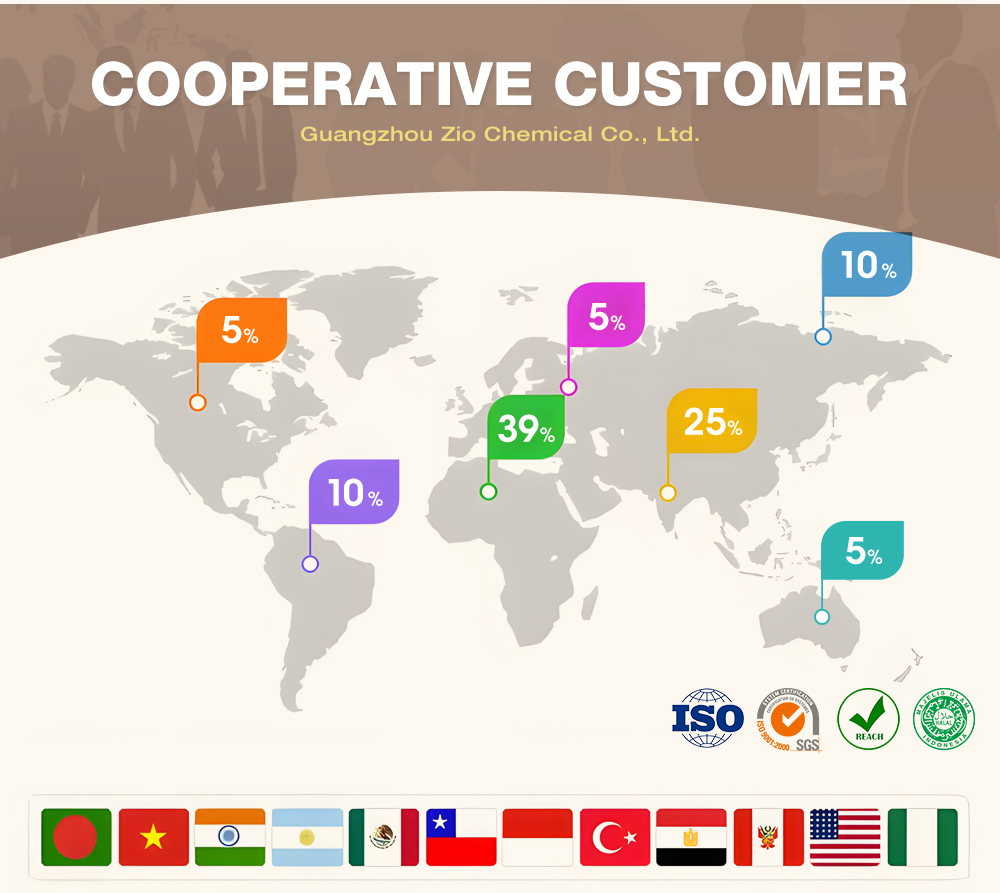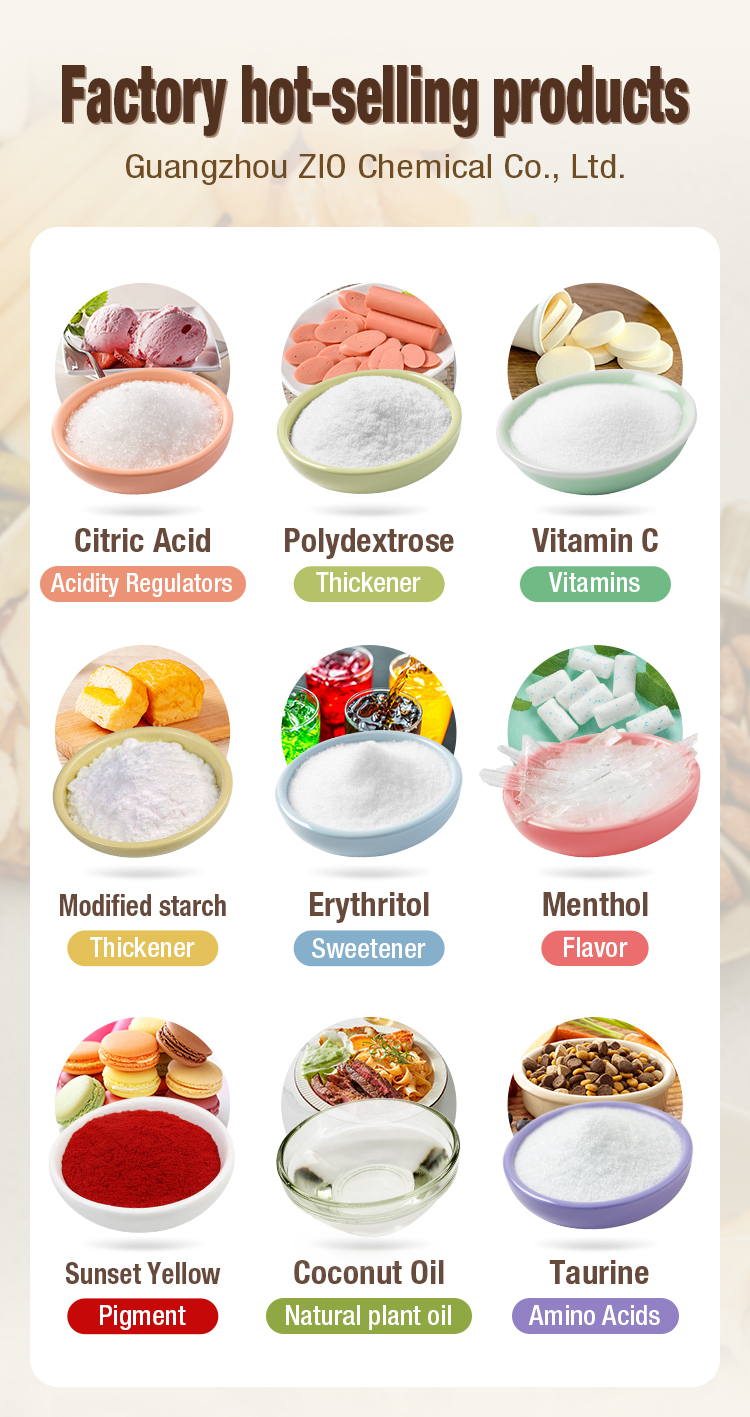| Availability: | |
|---|---|
| Quantity: | |











Citric Acid Monohydrate (CAS No.: 5949-29-1, E Number: E330) is a naturally derived organic acid obtained via microbial fermentation of renewable raw materials like corn starch or sugarcane. It presents as a white, odorless crystalline powder with a characteristic tart taste. With a strict purity range of 99.5%–100.5% (meeting the highest food-grade standards) and moisture content precisely controlled at 7.5%–9.0%, this additive complies with global regulatory frameworks including FCC (Food Chemicals Codex), USP (United States Pharmacopeia), and China’s GB 1886.235. Its versatility makes it widely recognized as the "primary edible acidulant" across food, beverage, and even cosmetic industries, where mild acidity and safety are prioritized.
Natural Acidity Regulation: Effectively adjusts pH levels in complex food systems (e.g., dairy products, sauces) to a range of 3.5–5.0, enhancing flavor harmony without introducing artificial aftertastes. In yogurt production, for instance, it refines tanginess while preserving the creamy texture of the product.
Preservation Enhancement: Inhibits the growth of spoilage-causing microorganisms (such as Aspergillus and Bacillus) by lowering the environment’s pH, reducing spoilage rates by up to 40% in perishable items like fresh-cut fruits and ready-to-eat salads.
Chelating Performance: Binds to free metal ions (e.g., iron, copper, manganese) in food matrices, preventing oxidative browning (common in apple slices or potato products) and degradation of fat-soluble vitamins (A, D, E, K).
Regulatory Compliance: Certified Halal (by JAKIM), Kosher (by OU), and ISO 9001, ensuring seamless integration into global food supply chains—from European confectioneries to Asian beverage manufacturers.
Beverage Industry: Added at a dosage of 0.1%–0.5% in carbonated soft drinks, fruit juices, and sports drinks. In citrus-flavored sodas, it balances the sweetness of high-fructose corn syrup and boosts refreshment; in isotonic drinks, it aids electrolyte absorption.
Confectionery: Improves gel strength in pectin-based jellies (e.g., gummy bears) by cross-linking with pectin molecules, and prevents sucrose crystallization in hard candies (like lollipops) during cooling, ensuring a smooth texture.
Fruit Processing: Acts as an oxygen scavenger in canned fruits (e.g., peaches, pineapples, apricots), maintaining their firm texture and bright color by slowing down enzymatic oxidation. It also reduces the need for synthetic colorants in these products.
Dairy Industry: Used in cheese production to coagulate milk proteins (replacing rennet in vegetarian-friendly cheeses) and in sour cream to standardize acidity levels across batches.
Q: How to store this product to avoid quality degradation?
A: Store in a cool (temperature 15°C–25°C), dry area with relative humidity ≤ 60%, and keep the original packaging sealed to prevent moisture absorption. Shelf life is 24 months when stored properly; avoid proximity to strong odors (e.g., spices) as it may absorb foreign scents.
Q: Is it safe for infants and young children?
A: Yes, it meets the World Health Organization (WHO)’s acceptable daily intake (ADI) standards of 0–3 mg/kg body weight. Heavy metal content is strictly controlled at ≤ 5 ppm (with lead ≤ 0.5 ppm, arsenic ≤ 0.1 ppm), making it suitable for use in infant cereals and baby food purees.
Q: Can it be used in non-food applications?
A: Absolutely. It is commonly used in cosmetic formulations (e.g., facial cleansers, shampoos) to adjust pH, and in household cleaners as a natural descaling agent for faucets and kettles.


Citric Acid Monohydrate (CAS No.: 5949-29-1, E Number: E330) is a naturally derived organic acid obtained via microbial fermentation of renewable raw materials like corn starch or sugarcane. It presents as a white, odorless crystalline powder with a characteristic tart taste. With a strict purity range of 99.5%–100.5% (meeting the highest food-grade standards) and moisture content precisely controlled at 7.5%–9.0%, this additive complies with global regulatory frameworks including FCC (Food Chemicals Codex), USP (United States Pharmacopeia), and China’s GB 1886.235. Its versatility makes it widely recognized as the "primary edible acidulant" across food, beverage, and even cosmetic industries, where mild acidity and safety are prioritized.
Natural Acidity Regulation: Effectively adjusts pH levels in complex food systems (e.g., dairy products, sauces) to a range of 3.5–5.0, enhancing flavor harmony without introducing artificial aftertastes. In yogurt production, for instance, it refines tanginess while preserving the creamy texture of the product.
Preservation Enhancement: Inhibits the growth of spoilage-causing microorganisms (such as Aspergillus and Bacillus) by lowering the environment’s pH, reducing spoilage rates by up to 40% in perishable items like fresh-cut fruits and ready-to-eat salads.
Chelating Performance: Binds to free metal ions (e.g., iron, copper, manganese) in food matrices, preventing oxidative browning (common in apple slices or potato products) and degradation of fat-soluble vitamins (A, D, E, K).
Regulatory Compliance: Certified Halal (by JAKIM), Kosher (by OU), and ISO 9001, ensuring seamless integration into global food supply chains—from European confectioneries to Asian beverage manufacturers.
Beverage Industry: Added at a dosage of 0.1%–0.5% in carbonated soft drinks, fruit juices, and sports drinks. In citrus-flavored sodas, it balances the sweetness of high-fructose corn syrup and boosts refreshment; in isotonic drinks, it aids electrolyte absorption.
Confectionery: Improves gel strength in pectin-based jellies (e.g., gummy bears) by cross-linking with pectin molecules, and prevents sucrose crystallization in hard candies (like lollipops) during cooling, ensuring a smooth texture.
Fruit Processing: Acts as an oxygen scavenger in canned fruits (e.g., peaches, pineapples, apricots), maintaining their firm texture and bright color by slowing down enzymatic oxidation. It also reduces the need for synthetic colorants in these products.
Dairy Industry: Used in cheese production to coagulate milk proteins (replacing rennet in vegetarian-friendly cheeses) and in sour cream to standardize acidity levels across batches.
Q: How to store this product to avoid quality degradation?
A: Store in a cool (temperature 15°C–25°C), dry area with relative humidity ≤ 60%, and keep the original packaging sealed to prevent moisture absorption. Shelf life is 24 months when stored properly; avoid proximity to strong odors (e.g., spices) as it may absorb foreign scents.
Q: Is it safe for infants and young children?
A: Yes, it meets the World Health Organization (WHO)’s acceptable daily intake (ADI) standards of 0–3 mg/kg body weight. Heavy metal content is strictly controlled at ≤ 5 ppm (with lead ≤ 0.5 ppm, arsenic ≤ 0.1 ppm), making it suitable for use in infant cereals and baby food purees.
Q: Can it be used in non-food applications?
A: Absolutely. It is commonly used in cosmetic formulations (e.g., facial cleansers, shampoos) to adjust pH, and in household cleaners as a natural descaling agent for faucets and kettles.


| Attribute | Detail |
|---|---|
| Name | Citric Acid Monohydrate / Anhydrous |
| Ingredient | Citric Acid |
| Specification | 25kg |
| Capacity | 25 kg |
| Place Of Production | Guangzhou, China |
| Shelf Life | 2 years |
| Storage Conditions | Store in a cool, dry place |
| Attribute | Detail |
|---|---|
| Name | Citric Acid Monohydrate / Anhydrous |
| Ingredient | Citric Acid |
| Specification | 25kg |
| Capacity | 25 kg |
| Place Of Production | Guangzhou, China |
| Shelf Life | 2 years |
| Storage Conditions | Store in a cool, dry place |
Product Advantages
Natural Acidity
Citric acid, often derived from citrus fruits like lemons, is a natural compound with a sour taste. It is widely used in the food and beverage industry as an acidulant in many culinary and beverage applications. It can be used to enhance the acidity of products, provide a tart balance to sweet flavors, and improve the overall taste profile of items like soft drinks, candies, and fruit-flavored snacks.
Citric acid is a kind of fruit acid, can be used to accelerate the cutin renewal, commonly used in lotions, creams,











Product Advantages
Natural Acidity
Citric acid, often derived from citrus fruits like lemons, is a natural compound with a sour taste. It is widely used in the food and beverage industry as an acidulant in many culinary and beverage applications. It can be used to enhance the acidity of products, provide a tart balance to sweet flavors, and improve the overall taste profile of items like soft drinks, candies, and fruit-flavored snacks.
Citric acid is a kind of fruit acid, can be used to accelerate the cutin renewal, commonly used in lotions, creams,












